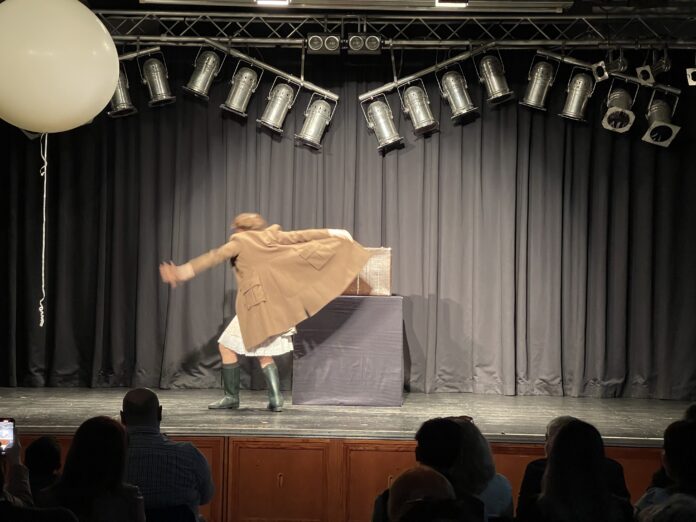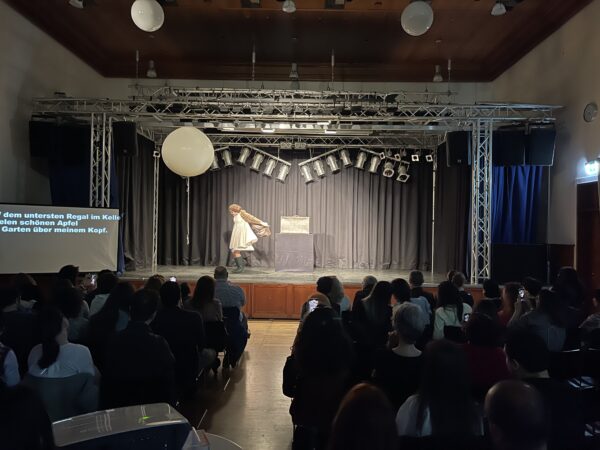
Narine Grigoryan in “May Family in My Suitcase”
Artsakh’s Drama Comes to Germany
by Muriel Mirak-Weissbach
Armenian Mirror Spectator
WIESBADEN, Germany, MAY 11, 2023 — As the humanitarian crisis in Nagorno-Karabakh, caused by Azerbaijan’s blockade of the lifeline Lachin corridor to Armenia, continues, news of the plight of its Armenian population seeps through now and then in the German media, albeit in all-too-brief form. But on April 22, the reality of the crisis occupied center stage in a theater in Wiesbaden, the capital of the German federal state Hessen. There, in the Georg Buch House, a capacity crowd of 80 theater goers, mainly from the local German-Armenian community, attended a performance of the monodrama, “My Family in My Suitcase,” which portrays the plight of a family in the contested region.
Starring Narine Grigoryan, prizewinning actress, director, and co-author with Sara Nalbandyan of the piece, the hour-long play tells the story of a family with three children in Nagorno-Karabakh. When an opportunity arises to have one family member flee the war-torn area, they decide it should be the young Narinka. Her grandfather goes to the airport every day in hopes of finding a place for her in the helicopter which should take her to Armenia and safety, but to no avail: too many wounded soldiers, handicapped persons, the aged, and the very young, are seeking to escape as well. While her grandfather struggles to arrange her flight, Narinka remains behind, alone in the car, alone with her thoughts, torn between fond memories of the past, and dreams — but also fears — of the future. Her father, cast as the hero of the tale, ends up in an Azerbaijan prison.

Narine Grigoryan in “May Family in My Suitcase”
Packed with suspense and emotion, the story is not all fiction, but is based on real events experienced by the family members of Narine Grigoryan. The Honored Artist of the Republic of Armenia completed her studies at the Yerevan State Institute of Theater and Cinema in 2002, with a degree in dramatic theater Directing. Continuing her development in association with theaters in Yerevan, Moscow, and St. Petersburg, she also studied Theater Management in Boston and Directing in Breslau, Poland. As an actress she has performed in more than 30 plays and films. Her career as a director includes work in the Tumanuyan State Puppet Theater, in the Stanislavsky Russian State Drama Theater and in the State Pantomime Theater. She has taught at the Yerevan State Institute of Theater and Cinema since 2009, and has served as artistic director of the Hamazgain State Theater since 2019. The winner of several prizes for her acting and directing skills, her performance in “My Family in My Suitcase” received the Grand Prix of the Aspindis International Solo Performance Festival in Lithuania, 2017, and second prize at the 11th International Monodrama Festival in Kiel, Germany, 2018. It has been performed also in Belgium, France, Austria and Armenia.
Victoria Bagoyan, the project director and coordinator, who flew from Yerevan to Frankfurt with Grigoryan, is a graduate of the Yerevan Economic and Juridical University, with a major in linguistics and pedagogy. She has participated in numerous theater festivals between 2009 and 2019, in Belarus, the United States, Costa Rica, Wales, and Stuttgart, Germany. Sets and costumes were the work of Viktoria Riedo-Oganesian, who received her Bachelor degree in Architecture at the National University for Architecture and Construction, and master’s degree in Scenery at the Zürich College of Arts, 2013-2015.
Armenian-German Cultural Exchange
The celebrated performance was the second such cultural event in this Wiesbaden venue in recent months, organized by the Demokratisches Volks- und Kulturzentrum (DVK), a social and cultural organization founded in 1976, which promotes Armenian-German understanding and integration. It offers language instruction and sponsors cultural activities in theater, choral music, folk dancing, and sports. In February it hosted a wonderful theatrical performance of Tumanyan’s fairy tales, featuring Armenian children from the area. The monodrama was cosponsored by the German-Armenian Student Club “HAIK,” founded in 2003 in Mannheim. This group supports student exchanges, the development of an international network of young academics, and Armenian-German exchange in culture, language, and economics in both countries.
As Karen Gharslyan, Chairman of the Wiesbaden DVK has put it, the aim of these cultural events is to “build a bridge between Armenian and German cultures, to further build on their foundations.” He sees Wiesbaden as an appropriate setting, a city with a proud heritage in “culture, art, and theater, where many Armenians (as well as others) take part actively in cultural life.”
A crucial component of cultural exchange is mutual comprehension; those attending the performance of the monodrama, performed in Armenian, were able to follow through summary subtitles in German.